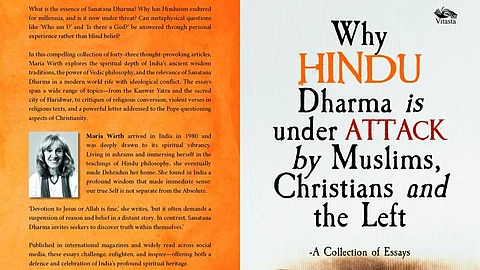
- Union Budget 2026
- Home
- NewsGram USA
- India
- न्यूजग्राम
- World
- Politics
- Entertainment
- Culture
- Lifestyle
- Economy
- Sports
- Sp. Coverage
- Misc.
- NewsGram Exclusive
- Jobs / Internships

This review was originally written by Saumya of Vitasta Publishing for the ‘books and beyond blogspot’.
I recently had the opportunity to read an upcoming book by Maria Wirth — a German author and seeker who has long written about the depth and beauty of Indian spiritual traditions. Her upcoming work is a bold, honest, and at times uncomfortable interrogation of the widespread hostility and misconceptions directed toward Hinduism — not just from the outside world, but also from within India itself.
Wirth’s central question is simple, yet profound: Why is Hinduism so hated, mocked, or dismissed — especially by those who often don’t understand it at all?
Wirth argues that Hindu Dharma has been misunderstood, misrepresented, and even demonised by three main forces: Christian missionaries, Islamic supremacists, and the global Left. The reasons range from ideological hostility and colonial hangovers to sheer ignorance. In the eyes of many critics, Hindu practices like idol worship, cow reverence, and vegetarianism are seen as primitive or irrational — even though they are rooted in a deep sense of sacredness and interdependence.
One of the most striking observations in the book is the contrast between Hindu Dharma’s inclusive nature and the exclusivist dogma of many Abrahamic faiths. Christianity and Islam often come with the threat of eternal hell for non-believers. In contrast, Hinduism holds that all paths can lead to the truth, and that spiritual experience matters more than blind belief. There’s no central authority, no forced conversions, no threats — just a lifelong journey toward self-realisation.
So why the hostility?
Wirth suggests that this very openness is seen as a threat — by those who believe only their way is right. Hindu Dharma doesn’t try to dominate, but it also doesn’t surrender. It survived invasions, colonialism, and now a culture war in its own homeland, where many English-educated Indians look down on their own traditions. Ironically, some of the harshest criticism comes from within — from those who’ve inherited the colonial mindset that anything Western is “modern,” and anything rooted in Indian tradition is “backward.”
One of Wirth’s key observations is about the asymmetry of religious tolerance. Hindus are often taught — and sincerely believe — that all religions are the same, that all paths lead to the same divine. But this generosity is rarely reciprocated. Most Abrahamic traditions explicitly reject the validity of other faiths and warn of eternal damnation for non-believers. So while Hindus grow up saying “Vasudhaiva Kutumbakam” (the world is one family), they don’t realise that many others do not see them as part of that family at all.
What Maria Wirth’s book does beautifully is not just defend Hinduism — it explains it, with clarity and conviction, especially for those conditioned to see it as regressive. She urges readers to move beyond colonial hangovers and to see Sanatana Dharma as a living, breathing tradition — one that celebrates the divine in all things, embraces complexity without fear, and recognises the truth that lies within.
In a world fractured by absolutism and religious superiority, the Hindu way of seeing — through multiplicity, compassion, and inner awakening — may be exactly what the world needs most.
(end of review)
From my side I feel that the book is good and helpful. In fact, my editor told me that she enjoyed reading it and it changed her outlook…
The book will be available in Indian bookstores and on amazon.com. As of today, July 20th (it is just out), it is available under the following links:
https://www.flipkart.com/hindu-dharma-under-attack-muslims-christians-left-collection-essays/p/itme00daf4da3fc5?pid=9788119670659
https://www.vitastapublishing.com/store/new-arrivals/why-hindu-dharma-is-under-attack-by-muslims,-christians-and-the-left-a-collection-of-essays-detail
Book is now also available for pre-order on
Amazon US: https://www.amazon.com/dp/8119670655
Amazon UK: https://www.amazon.co.uk/dp/8119670655
Kindle version may also soon be available. [NG-FA]
